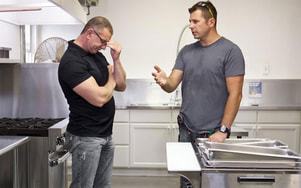 Any kind of organizational dysfunction will eat talent for breakfast. It will take any potential and destroy it. Everything was primed for success with the Lakers. Magic was coming back, they were locking in LeBron in free agency, they were sizzling on social media. And then came missing the playoffs, leaks about trading half the roster, and Magic resigning in a press conference without telling his boss. It's no different in churches. Dysfunction destroys vision. Dysfunction destroys optimism. Dysfunction destroys mission. Dysfunction destroys fellowship. Dysfunction, when left to fester and grow, will spread like a cancer throughout an entire church. You don't have to feed dysfunction for it to grow. It does it on its own. If we're going to push back against dysfunction in the church, it starts at the top with clear communication, convictional leadership, and accountability for fruitfulness and faithfulness from pastoral leadership. One of the many hats that pastors wear is that of culture narrator. It's possible for a pastor to shape the culture by what's shared, communicated, valued, celebrated, and reinforced. Dysfunction happens when there's really no rhyme or reason for how things happen. There can be a number of other contributors to organizational dysfunction, but if we as leaders aren't willing to look in the mirror and acknowledge our part in it, we're never going to see improvement. A second way we can push back against dysfunction is for there to be clearly established roles, responsibilities, and lines of accountability established. Dysfunction happened in the Lakers when there wasn't clarity of roles and spheres of responsibility. When we onboard a staff member, we communicate clearly what is expected and who they are responsible for and to. When members join, we train and equip and deploy them into a ministry or group so they know where they thrive. Committees operate with a clear job description. Most of this I've learned the hard way. A third way we push back against dysfunction is that we set an expectation of health. In sports this is called a "winning culture." That's why the same teams pick late in the draft, and the same teams pick early in the draft. Some teams have an expectation of health. Churches can too. We can have an expectation of reaching our communities, an expectation of fellowship, an expectation of growth, an expectation of service. Or we can just slosh through the motions and hope something good happens. A fourth way to push back against dysfunction is to make sure that not only are there roles and responsibilities but that the right people are in the right seats. Ministry is not like an assembly line where you can plug in someone and the job just continues. There's a need to carefully assess giftedness, calling, character, skill, chemistry, and more. We have to make sure we're putting people in the right place so they can thrive. No one wants a grouchy children's worker who doesn't like kids. And you can't have a Luddite working with your technology. How do you push back against dysfunction?
1 Comment
 A couple weeks ago Carrie and I saw that one of our favorite TV shows was coming back with new episodes. If you’ve never seen Restaurant Impossible on Food Network, it’s worth checking out. The premise is that failing restaurants contact celebrity chef Robert Irvine in the hopes that his crew can overhaul the restaurant and give them a second chance. They normally overhaul everything: the menu, the appearance, and sometimes even the staff. After 48 hours they unveil a reveal where the restaurant reopens to a full house. It’s really special. But then you see the success rate for these restaurants is less than 50%. Food Network Gossip has the list of restaurants that have aired, and 105 out of 144 have closed. Restaurants that were family treasures, a life’s work, or that were an effort to live the Dream… gone. The overwhelming reason many of them close is that the cost of change was greater than the cost of losing everything. Churches and ministries do the same thing. When faced with change or death, many times they choose death (intentionally or not). We can, and should, learn from Restaurant Impossible. The carryover value is immense! Desperation Leads to Quality Reduction - “CANNED!” is one of Irvine’s common things he screams when tasting the food. When restaurants get desperate, they start cutting quality. They get canned food, lower quality products, and skimp on the details like cleaning. Churches fall into this when they go into survival mode. They cut budgets way back to missions and ministries. They start into deferred maintenance. And they start and stop initiatives like they’re throwing spaghetti on the wall. Hard Truth is Hard to Hear - In the show, the owners have to confront the hard reality. Many of them are in denial of how close they are to ruin, or how poor their food is. Sometimes they even threaten to stop the renovation because they don’t want to hear the hard truth. Churches and ministries sometimes need to hear hard truth that things aren’t working. It’s hard to eliminate ministries that don’t accomplish anything anymore. It’s hard to hear that things aren’t going well. But we can’t live in an echo chamber. Lasting Change Starts Small - If you really think about it, what the crew does in Restaurant Impossible isn’t that much. They repaint, they get some new furnishings, they put some new items on the menu, and they open with a bang. It’s small. But it provides a spark. Churches that find themselves on the brink sometimes just need a spark, a small victory. Kotter calls it gaining momentum, Rainer calls it low hanging fruit. Sometimes if you want to see lasting change in a church, it can start as easy as decluttering closets or weeding the flower bed. What’s been missing in many of these churches and restaurants is hope. Starting small can give that dose of hope. Culture > Renovation - It’s cool to see the renovation finished, when there are tears of joy and the credits roll with a full restaurant and a busy kitchen. But once the cameras are off, culture sets in. Culture is what is expected from the leadership. Culture is what pushes through when the initial rush settles. Sadly, many of the restaurants that close are because they go back to the same habits that got them in trouble. Churches without a healthy culture won’t see lasting change. That starts from the pastor setting the tone. Is it a culture of intentional health, growth, mission, and discipleship? Or is it a culture of laissez-faire? What other connections would you make from the show to ministry?  We love baby steps. Whether it's with something like Dave Ramsey to get out of debt, the three-bite rule (whenever we have something for dinner the kids have to take 3 bites), or exercise programs like Couch to 5K, we try to make things easy for people to follow when they get into something new. For Christian parents, even though our faith is central to our lives, it can be hard to begin having spiritual conversations in our families. We know we should. We've heard about it. We watch our kids spend their idle time knocking over angry birds or building stuff on Minecraft or whatever Fortnite is. And we know that what matters most is our kids' spiritual health. But how do we take baby steps? 1. Start by asking what they did in church - As easy as a question at lunch or dinner after church. Just ask the kids what they did at church. Talk about the Bible lesson. If they got handouts or take-home materials, walk through them. You can even read the story from the Bible as part of the asking. The joy of curriculum is it's written for comprehension at their age. 2. Bedtime prayer time - Those moments before bed are often the quietest moments with kids, no matter their age. And even if you have older elementary or teenagers, popping in to check on them or tell them goodnight offers a chance to ask them to pray. And in doing so you can pray for them specifically but also find out who they know or other situations to pray about. 3. Roses & Thorns - This is one of our favorites. We use this to talk at dinner about our day and find out what went really well and what didn't. We try to use the language of thorns instead of "what made your day bad?" because we want to frame the discussion so our kids don't fixate on the negative. But by asking them what went well and what didn't about their day can be a nice and easy way to encourage or pray. 4. Grab a Devotional Book - Even if your kids are too young to read on their own, you can still grab helpful devotional books to read along with them. For older kids, the options are almost too many to count. Check out CBD's options here, and Lifeway's here. One we have really enjoyed is a book called The Ology: Ancient Truths, Ever New. Along with that is Indescribable, written by Louie Giglio. 5. Parents, read a good book - I think it's really worthwhile for parents to read something helpful. I'm a fan of Age of Opportunity for parents of teenagers, Paul Tripp on 14 gospel principles for parenting, Give Them Grace, Shepherding a Child's Heart, Instructing a Child's Heart, Grace-Based Parenting, Treasuring Christ When Your Hands are Full, Sticky Faith, Sacred Parenting, and Family Worship. Remember, these are baby steps. Don't try to tackle everything. Start small. And if it doesn't work out immediately, step back and punt. Remember, doing anything to help shape your family's spiritual health is better than nothing.  Earlier this week, I wrote about the Four Types of People Never to Recruit to Leadership. The flip side of that is to think about the four types of people that we want to recruit to leadership positions. The Encourager - Encouragers to a team are like air fresheners in the room. They make even difficult situations better. They're optimists. They can carry a worn out leader or team. The Encourager is the guy who meets you at the door with a kind word, and when they say they're praying for you, you know they mean it. The Encourager isn't The Yes Man. The Yes Man won't ever be honest with you. The Encourager will be constructive and helpful even when having difficult talks.  The Builder - Builders will work to construct healthy teams, healthy systems, healthy ministries. They're different than The Critic, who always points out flaws and faults. Builders will work with what they're given and bring people together, they'll work out policy and procedure, they'll do the hard work of taking what they see as broken and repairing it. Critics will just point. Builders will fix what they see as broken. You know with a Builder that when they point out flaws they'll match it with effort to fix what they see.  The Unifier - Unifiers will work on bridging gaps between people. Not everyone in a church is going to think alike on issues or ministries. But unlike The Divider (or Pot Stirrer) who will make divisions wider, the Unifier tries to find common ground. The Unifier knows that we have much more in common than we realize. Unifiers are incredible for leadership because they'll join the work of the Builder to bring people to a solution.  The Confidant - Leaders, let's be honest. Sometimes we need a steam release. We hold everything in, our anxieties, frustrations, victories, hurts, and annoyances. If we don't have a way of releasing the steam valve, we'll blow our top. The Confidant is the kind of person who will take what you have to say, absorb it, and keep it to themselves. They won't use your vulnerability against you. But in a more general sense, Confidants make great team members because they will handle sensitive issues with great care. They're trustworthy. Who else would make an ideal member for leadership? |
Scott M. DouglasA blog about leadership and the lasting legacy of family ministry. Archives
August 2023
Categories
All
|
 RSS Feed
RSS Feed



